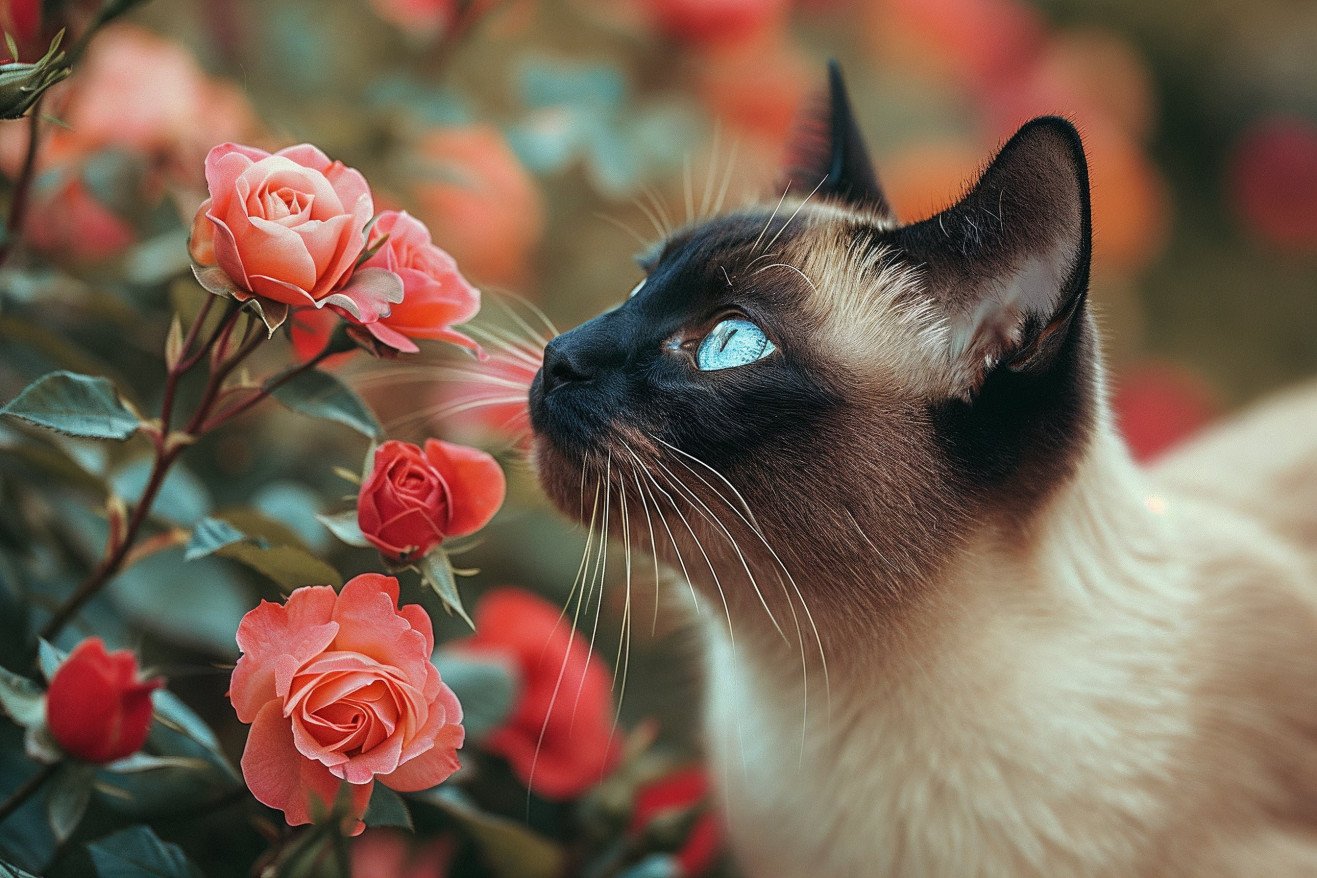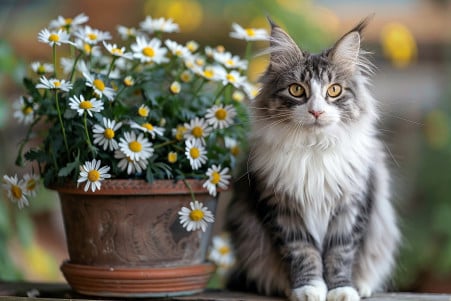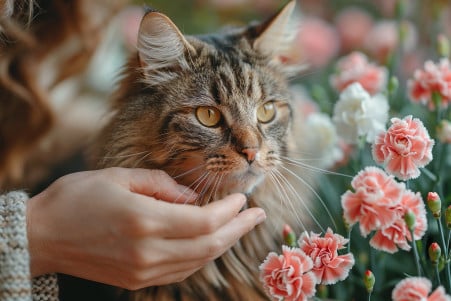Can Cats Eat Roses? Here’s What You Need to Know About Pet Safety
10 February 2024 • Updated 8 February 2024

Despite being a symbol of love, could roses be a danger to your cat? While roses are not poisonous to cats, the thorns can be dangerous. That said, you should also be aware that pesticides and flower food used on roses can be toxic to cats. If you think your cat has been exposed to any of these substances and you see any symptoms of distress, you should always contact your vet.
To get a better idea of the potential dangers of roses for cats, we’ll look at a number of different research topics, including veterinary science and toxicology. We’ll cover everything from the dangers of plant consumption to the dangers of pesticides and what this means for cats in general.
By the end of this article, you’ll have a well-rounded understanding of this topic that will help you keep your cat safe and healthy in an environment that includes both pets and plants.
Are roses poisonous to cats?
Why It’s Important to Know Which Plants Are Toxic to Cats
While roses are not toxic to cats, there are many other plants that are. Lilies, for example, are highly toxic to cats and can cause kidney failure even in small amounts, according to Cats Protection. Symptoms of plant poisoning in cats can be mild, like drooling or vomiting, or severe, like difficulty breathing, seizures, or coma, according to the ASPCA.
If you think your cat has eaten a toxic plant, it’s important to act fast. Remove any plant material from your cat’s mouth or fur, and get your cat to a veterinarian right away.
Organizations like the ASPCA and Cats Protection not only help to raise awareness about plant toxicity, but they also help pet owners by providing information on how to recognize plants that are toxic to cats and what to do if your cat eats a toxic plant.
Knowing which common plants are toxic to cats can help you make your home a safer place for your pets. In addition to toxicity, there are other risks to consider, like the potential for injury from thorns on plants like roses, which can be a different kind of danger for a curious cat.
The Menace of Thorns: Physical Harm from Roses
In addition to their beautiful blossoms, roses also pose a threat to curious cats due to their thorny stems. The physical makeup of a rose plant includes sharp prickles—often referred to as thorns—that can harm cats that swat at or chew on the stems.
Cats that swat at or chew on the stems can suffer from a range of injuries, from minor scratches to more severe puncture wounds, especially if they try to eat the thorns. According to PetMD, rose thorns can also cut a cat’s mouth or gastrointestinal tract, which can lead to internal bleeding.
If your cat is injured by a rose thorn, you can help by administering immediate first aid. Gently clean the area with pet-safe antimicrobial wipes or a cat-safe wound cleanser.
That said, even minor injuries can become more serious if they’re not properly treated, so it’s important to get veterinary care for puncture wounds or any other injuries that don’t improve. This will help ensure that the wound doesn’t become infected and that it heals properly, as Dr. Barri J. Morrison explains.
In addition to protecting our pets from the physical harm posed by roses’ natural defenses, it’s important to be mindful of the invisible threats. The chemical treatments that are often used on these flowers can add another layer of danger, which underscores the importance of taking a well-rounded approach to protecting pets from the risks associated with household plants.
Pesticide Peril: The Hidden Dangers on Roses
Although roses themselves aren’t poisonous to cats, the pesticides used to treat them can be a different story. Pyrethrins and pyrethroids, which are commonly used by gardeners to control pests on roses, are highly toxic to cats.
An article by VCA Animal Hospitals notes that cats are especially susceptible to these chemicals, listing symptoms that include drooling, vomiting, difficulty breathing, and seizures. The problem is that cats metabolize these chemicals more slowly than dogs due to differences in liver metabolism.
If your cat is exposed to pesticides, the Pet Poison Helpline warns that it’s important to seek veterinary care immediately. There is no specific antidote for pyrethrin or pyrethroid toxicity, and treatment typically involves decontamination, like bathing with liquid dish soap, and supportive care. With early treatment, the prognosis for recovery is good.
To avoid pesticide toxicity, it’s important to either choose pet-safe products or plants that haven’t been treated with pesticides. PetMD recommends that pet parents only use cat-appropriate flea and tick products consistently and make sure that cats don’t enter treated areas until they’re safe. By following these guidelines, we can minimize the chances of pesticide toxicity and help our cats stay healthy and happy, enabling them to enjoy roses’ beauty without the risk.
Can Houseplants Help Your Cat Breathe Easier?
Houseplants, including roses, have been appreciated for their beauty for centuries, and there is a growing body of research that suggests they can also help clean the air. A study from the University of Birmingham, covered by ScienceDaily, found that common houseplants can reduce indoor nitrogen dioxide (NO2) levels by as much as 20%. This is important because NO2, among other pollutants, can contribute to respiratory issues in both humans and cats.
That said, the impact of plants on indoor air quality has been the subject of some conflicting research. A systematic review published in Environmental Science and Pollution Research found that while plants can reduce levels of specific pollutants like formaldehyde, benzene, and toluene, the overall impact on air quality is uncertain.
The review’s authors noted that the indoor environment is so complex and that pollutants are so diverse that it’s hard to come to a firm conclusion about the impact of plants on air quality.
For cat owners, it’s important to make sure that indoor air quality is as good as it can be. While plants may help, it’s important to make sure that their impact is balanced with good ventilation and regular cleaning to make sure that potential respiratory irritants for cats are kept to a minimum.
When thinking about the impact of air quality on cats, it’s also important to consider whether they have any allergic sensitivities to the plants themselves.
How to Help Cats With Pollen Allergies
While roses are safe for cats, they can still be allergic to the pollen that comes from the flower. Like people, cats can be allergic to a variety of different things, including pollen. According to PetMD, common signs of allergies in cats include itching, red or dry skin, ear infections, licking or scratching, vomiting, and diarrhea. Allergies can be caused by pollen from plants or direct contact with the plant.
Dr. Jangi Bajwa from the VetDERM Clinic notes that a veterinarian will need to do a full workup to diagnose pollen allergies and rule out other causes like food allergies or parasites. Allergy tests, including serum allergy tests and intradermal testing, can be used to determine the specific allergens that are causing your cat’s symptoms. Once the allergens are identified, treatment can include desensitization therapy and medications to control symptoms.
If you want to make your home more comfortable for a cat with pollen allergies, you can try to limit their exposure to roses and other potential allergens. Regular cleaning to reduce pollen and dust and monitoring for signs of allergies can help you keep your home comfortable for a cat with allergies.
By doing this, you can help your cat live a long, healthy life surrounded by the beauty of non-toxic flowers like roses.
The Last Petal: Roses and Cat-Friendly Gardening
After walking through the garden of information, it’s pretty clear that roses, with their intoxicating beauty, are not toxic to cats. This should be a relief to pet parents who love the flowers. However, the thorns on roses can be a hazard, and the pesticides used on roses are a concern for potential poisoning, as noted by the Pet Poison Helpline and veterinary toxicologist Dr. Renee Schmid.
To be safe, responsible gardeners should remove the thorns from roses to prevent injury and choose organic, pesticide-free roses to prevent chemical poisoning. If an accident does occur, it’s important to get to the vet as soon as possible. With knowledge and awareness of the symptoms of poisoning, cat parents can ensure that their cats and their roses can coexist in peace.
In the end, roses can still be a part of your floral arrangements at home, but do so with the knowledge of how to keep your pets safe. Enjoy the pleasures of cat-friendly gardening by surrounding yourself with the beauty of roses that are free of thorns and chemicals, and create a safe space for your pets that’s full of life and love.


